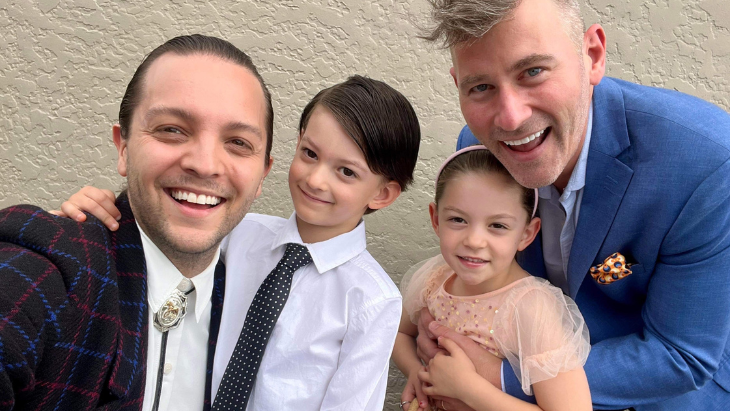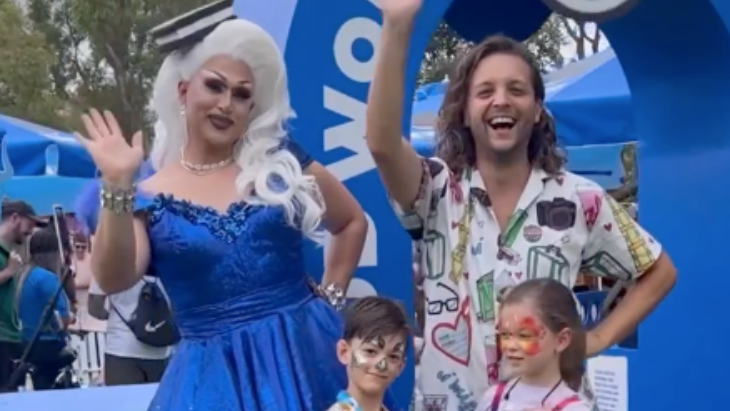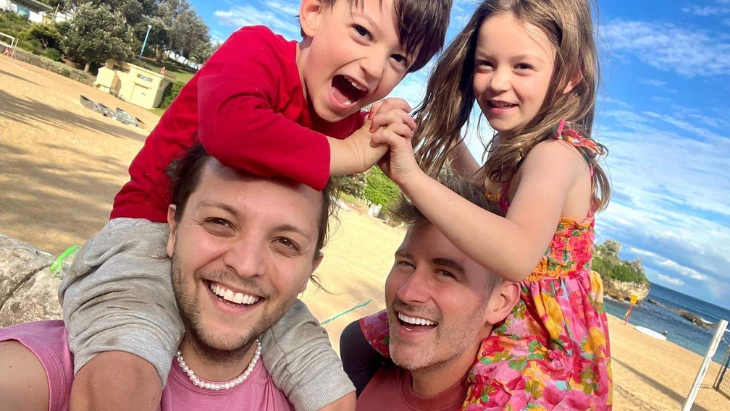
ellaslist sit down with Sean Szeps, a proud gay father of twins and host of the podcast 'Come Out Wherever You Are'. Sean shares his journey towards becoming a father and navigating same-sex parenting, as well as discussing the importance of promoting acceptance and inclusivity for the LGBTQ+ community.
Through his work as a social media advocate and influencer, Sean aims to amplify queer voices in the parenting conversation in Australia and promote greater representation for queer parents. His story serves as a powerful reminder of the importance of representation and the need for greater understanding and acceptance of diverse families.
Can you tell us about your background and your journey towards becoming a proud gay father of twins?

My name is Sean Szeps. I’m an American father who met and fell in love with my Australian man, my husband Josh, when we were both living in New York City. In 2016, a close family member of mine offered to donate her eggs to us. We were then able to make embryos through the IVF process in Los Angeles and have a selfless surrogate carry our twins, Stella and Cooper.
Your podcast, ‘Come Out Wherever You Are’ has won awards for its unfiltered account of raising twins as a proud, gay dad. Can you tell us more about the podcast and how it has impacted your life and others’ lives?
I developed the podcast because I wanted to create a space dedicated to sharing queer Aussie stories. I realised during the pandemic that I didn’t truly understand enough about our beautiful community, specifically the various letters of the LGBTQIA+ alphabet that weren’t G. I began exploring various creative avenues and realised during my research there was a gap in the market… helping to educate people about the coming out journey. This moment, coming out to our family and friends, is often the most difficult hurdle we’ll have to jump over in our lives. And then it’s over and simply brushed back into the closet, if you will. I wanted to hold space for these stories and break them apart for allies to hear.
The more we know, the better prepared we can be if someone comes out to us in the future. It’s highly likely it will happen to you, so I wanted to make a bit of an educational audio guide that will never go out of style.
In light of the upcoming WorldPride celebrations, can you talk about your experience navigating same-sex parenting and educating your children on sexuality and belonging?
I won’t lie, it hasn't always been an easy road. But the truth is, the world is so much more accepting than it was when I was a kid. Growing up, I was told - regularly - that straight parents were the only types of parents. That children needed a mother and father to thrive. But we know that’s not true.
Single parents, queer parents, grandparents as caregivers all do their part to help raise the next generation of children. And unlike when I was a kid, we have amazing examples all around us - in and outside of the media - of various types of families across the gender spectrum who are raising happy and healthy kids.
Do we experience social speed bumps along the way? Yes, of course we do. We meet homophobic people at the playground or uneducated Uber drivers who feel it’s within their right to share their discomfort with our modern family. But you have to grow a thick skin when you sit in the minority. And mine is built out of solid gold.
I simply brush it all off and try to use the uncomfortable conversations as an opportunity to educate them and better myself. Other than who I’m sexually attracted to, the parenting experience is the exact same. I wake up, just like heterosexual parents, and make sure my children are happy. I feed them the same, bathe them the same, change their nappies and pack their lunches and get practice maths just like every other parent does.
Being queer doesn’t mean parenting goes easy (or hard) on you. It just means you have to deal with adult bullies. As far as our children are concerned, we have always tried to surround them with educational content that shows various types of families. We communicate with them often about what other people might say and help to prepare them with compassionate and empathetic responses.
When people ask, ‘where’s your mum?’, they just laugh at them and simply say, ‘we have two daddies’. They know there’s nothing to be ashamed of, but they also know that most people have a mommy and a daddy. The adults are (almost always) apologetic.
The truth is, we’ve chosen to live in an accepting part of Sydney, a privilege we don’t take for granted. We’re confident our children will grow up knowing their family is a bit different but that they are loved and cared for. They might deal with bullies, but I parent for the adult they will become. And on the other side of adolescence, I’m hopeful they will find a loving group of friends who think of our family as just as boring as their own.
You recently partnered with Oreo for their limited-edition cookies stamped with ‘Proud Words’. Can you tell us more about the partnership and why proud words are important for fostering connection and acceptance?

I have to tell you, I’m an Oreo-superfan. Growing up in America, they were a staple of my childhood. When they reached out and asked me to be a Pride Ambassador, I screamed and jumped at the opportunity to be involved. Oreo is the official Snaking Partner of Sydney WorldPride 2023 and Sydney Gay and Lesbian Mardi Gras, and they’ve released Special Edition Original cookies to celebrate.
Oreo easily could have just slapped a rainbow logo on their Instagram and called it a day. But they went a few steps further and physically changed their products and packaging to show our extra community support, inspiring us to grab a cookie and start a conversation with the words written on them. Proud Words like ‘Love’, ‘Pride’ and ‘Celebrate’ have a unique meaning to every member of our community, but we aren’t often asked to talk about it - not even with the people we love most.
By inspiring these types of conversations at home with friends and family, we can help make the world (or at least our home and community) a more loving and accepting place.
How do you believe conversations surrounding sexuality and LGBTQ+ issues have changed in recent years, and what still needs to be done to promote acceptance and inclusivity?
When I was a child, I couldn’t find examples like myself in movies or on television. Even as I reached adulthood, these examples were few and far between. And let’s be real; we were usually the butt of a sick joke. Now, we’ve gone global. Queer storylines are woven into films, television and every facet of the entertainment industry. Our stories are no longer brushed under the carpet. And this, undoubtedly, makes the world a better place, as the average person is given opportunities to see us as fully formed people, capable and worthy of romance and success just like heterosexual people.
The queer community, thanks most recently to the AIDS epidemic, has a lot of stigma they carry around with them. Judgement and false stereotypes that we have to fight, even at home. When we get opportunities to share our stories, we help the next generation of queer kids live an easier and more accepting life as they work through their identity. We’re getting better and better, but I’d like to see more. Specifically in the parent space. Queer people and parenting are not synonymous at the moment. And if you can’t be yourself without seeing yourself, you need examples of proud queer parents to know it’s an option for you.
When we ask questions about parenthood in the media space, we don’t always need a straight white woman answering the questions.
Can you provide any advice or tips for parents who may be struggling to discuss sexuality and LGBTQ+ issues with their children?
If you’re not sure where to start, try removing yourself from the equation and instead lead with entertainment. Watch a movie that’s age appropriate like ‘Love, Simon’ or a television show like ‘Heartstopper’ or ‘Heartbreak High’. Then, use the themes and characters to spark aconversation afterwards. Instead of pushing an obvious agenda, simply leave it open-ended.
‘How did you feel about that?’ or ‘What did you think of XXX characters?’ and let them lead the way. If they aren’t willing to open up to you, you can get a good example by showing your support for the community. This might not matter to them at all as they might not be queer, but if they are - or are considering exploring this - you will be marked as a ‘safe space’ in their mind.
The other thing to take into consideration is that the world has changed a lot since you were a kid. Oftentimes, we project our own trauma or fears onto our children without considering the ways in which society has changed. In my experience, most young people - thanks to the internet - are aware of queer people and simply don’t care. More and more young people are coming out and exploring the use of various pronouns, so in some instances if you’re struggling to discuss these issues… let them lead the way.
Be honest. Tell them you’re struggling. Give them an opportunity to teach you.
What do you hope to achieve through your work as a social media advocate and influencer, and what impact do you hope to have on your audience?

My goal is simple: weave queer voices into the fabric of the parenting conversation in Australia.
I want a seat at the table, a chance to share our stories so that heterosexual Aussies realise that we’re actually not that different. The more stories and videos I share, the less stigma is attached to queer parents in this country. I really believe that. And this work will hopefully mean that young people will grow up thinking they can become a parent, just like I have.
Can you discuss any upcoming projects or initiatives you have planned for promoting acceptance and inclusivity?
I have a book, my very first, coming out in June. I haven’t announced it publicly just let - we’re only a week away from the grand cover reveal - but watch this space (@seanszeps). The book will, without giving too much away, help educate Australia on how queer people like me navigate the path to parenthood when the heterosexual parenting script simply doesn’t apply.
Finally, what message do you have for those who may be struggling with their identity or feel isolated and alone?
If the most recent data is accurate, then there are 800,000,000 queer people living on planet earth right now.
Sometimes, this journey can feel very isolating, like you’re the only queer person on the planet. Especially if you’re dealing with issues as a young person living at home with a straight family.
But just sit for a second with that number and let it sink in. Not only are you not alone, but the community you’re a part of is a very large one.
We’re in every town, in every state, in every country on planet earth. We come in all shapes and sizes and we all struggle just like you are struggling.
Whatever you’re feeling, please know that you will find a community that feels the same way you do one day. It may take some time and a little bit of effort, but I promise you were here waiting.
Come on in (or out), the water is absolutely fabulous.
You can see more from Sean Szeps on his Instagram.
Want More Pride In and Around Sydney?
Join The LET LOVE SHINE Celebrations At Westfield Bondi Junction
Sydney WorldPride Family Friendly Events
Sydney WorldPride 2023
Have you signed up for our newsletter? Join ellaslist to get the best family and kid-friendly events, venues, classes and things to do NEAR YOU!
Reviews



 Pick a Date
Pick a Date


